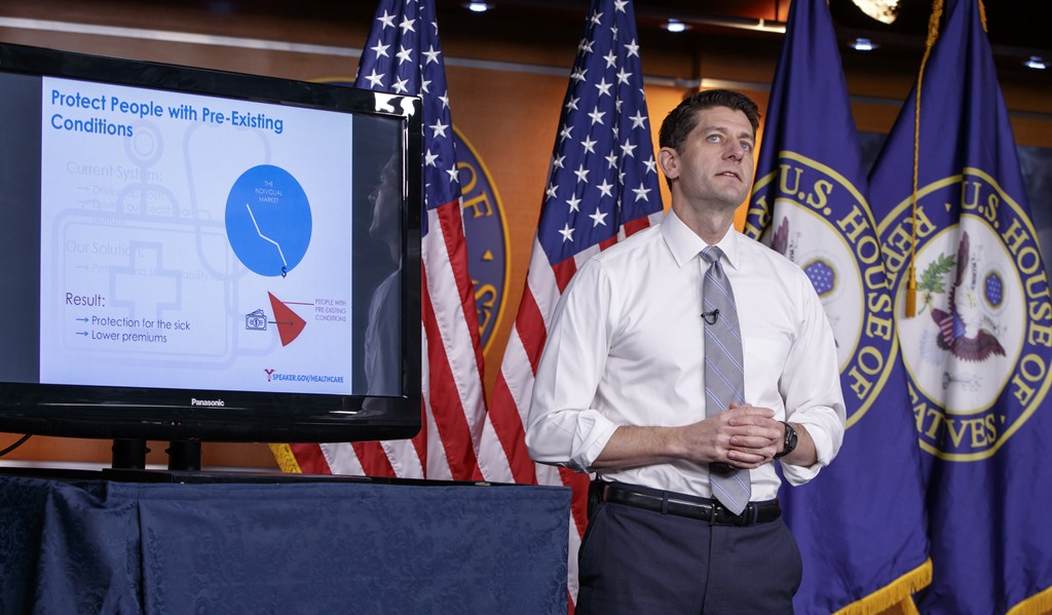The good should never be the evil of the perfect. The Paul Ryan health-care bill is a very good first step. Massive repeal of Obamacare tax hikes will be great for the economy. Getting rid of the Affordable Care Act mandates will be great for health care. Private-sector competition and choice are always better than government-run anything. The GOP has to practice bipartisanship within itself.
All this health-care reform stuff makes my head spin. And that’s why I’m putting all my conclusions at the top of this piece.
I think the House and Senate GOP can make the Ryan blueprint even better. And I’m hopeful that the congressional leadership, along with the Trump administration, will do just that.
But let’s just review a couple key points about the Ryan bill -- or the American Health Care Act (AHCA). (There’s no way to go through this whole deal.)
First, there’s no point in obsessing over the CBO numbers. Their Obamacare enrollment predictions were so off the mark that there’s no reason to believe their estimates for the AHCA will be any better. And we have so little experience, so little data, and such massive reform, I don’t think anybody could accurately model it. In this case, policies, not forecasts, are the key. Americans are a lot smarter than the professors think.
But one thing that really astonishes me is that both the CBO and the Joint Committee on Taxation (JCT) continue to stick to static estimates on tax changes. To wit: The biggest tax-hike repeal in the AHCA is the net investment income tax, which is primarily the capital-gains tax. CBO and JCT score it as a $158 billion loss over ten years. Yet history nearly always teaches us that when the cap-gains tax rate is cut, there’s more investment, more risk-taking, more new business start-ups, and more economic growth -- and hence, higher revenues.
Recommended
Ryan Ellis of Forbes was the first to point out the pro-growth, tax-cutting advantages of the ACHA. Not perfect, but really good.
I count 13 tax cuts in the Ryan bill. And you could argue that these cuts will segue right into the Trump tax-reform proposals for business and individuals.
Stubbornly, I still believe that the business tax-reform package -- nice and simple, with repatriation, lower rates, and immediate expensing -- should be grafted onto the health-care reconciliation bill. Technically, this is possible. In fact, some of the new health-care regulations, which are supposed to come later, could also be tacked onto the reconciliation package.
This might all come down to a new Senate parliamentarian, but so be it.
Next, health-care expert Betsy McCaughey has been writing about the need to separate two groups -- the healthy and the seriously ill. The sickest 5 percent of Americans consume 50 percent of the nation’s health care. Addressing this, Paul Ryan includes taxpayer-funded grants to states that establish new high-risk pools. But that may not be enough.
America is a generous nation. To help roughly 500,000 sick people in the individual market, the federal government should transparently subsidize this group, perhaps in the form of vouchers, or guarantee a national risk pool. The cost would be a third of Obamacare subsidies. The GOP should say this explicitly.
And this is the key: If you separate out the healthy from the ill, insurance premiums will plummet.
Ironically, with more choices and plunging premiums, millennials and other groups might choose to enter the private insurance exchange market and thereby increase enrollment into the AHCA. Think of it. Incentives matter.
Another point: The Ryan tax-credit subsidies look too generous to upper-end earners and insufficiently generous to lower-income earners. Avik Roy, recent founder of the Foundation for Research on Equal Opportunity, finds that age-adjusted and means-tested refundable tax credits should focus on individuals earning $40,000 to $50,000 and families with children earning up to perhaps $70,000. These are the working-class folks who need help. A tax credit for someone earning $150,000 strikes me as way too high.
And for the people in poverty at the low end, smooth the benefit cliff as much as possible to avoid incentives for a poverty trap.
Elsewhere, Medicaid reform must be done very carefully. And the insurance-company giveaway, which allows insurers to slap a 30 percent penalty on late enrollees, should be abolished.
Of course, there’s lots more inside the Ryan plan. But through all this complexity, we should not lose sight of the fact that however amended, the AHCA will abolish mandates, open the door to free-market choice and competition, provide universal access, generously protect the poor and the sick among us, and slash taxes -- all of which gives us a stronger health system and a faster growing economy.
So now the GOP has to practice bipartisanship within itself. Let’s get to it.
























Join the conversation as a VIP Member